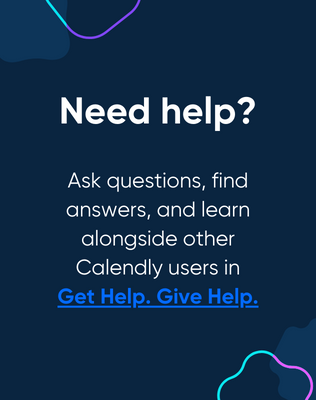Hi
When using the customer booking redirect page the following information is passed back to the site from calendy
How do you get the event information from the above querystring to actually query the API.
Calendy send you the invitee UUID, which is useless without the scheduled event ID, and they send you the event type ID, which again is useless for querying a scheduled event.
I cannot find any method in the API where the passed information can be used to query the invitee or the scheduled event since the critical piece of information (scheduled event ID) is not supplied.
What am I missing? or are you expected to query and get a list of all scheduled events for a time period, then run through every returned event and query the invitees and then match that against the passed invitee UUID? That seems like a ridiculous amount of overhead instead of just supplying the scheduled event id in the data?
I am not looking for a webhook solution, I have tried that, and while all the required information is received, it is unreliable. Only 1 in every 5 bookings are sent to the webhook.
Thanks
Tyrone.




